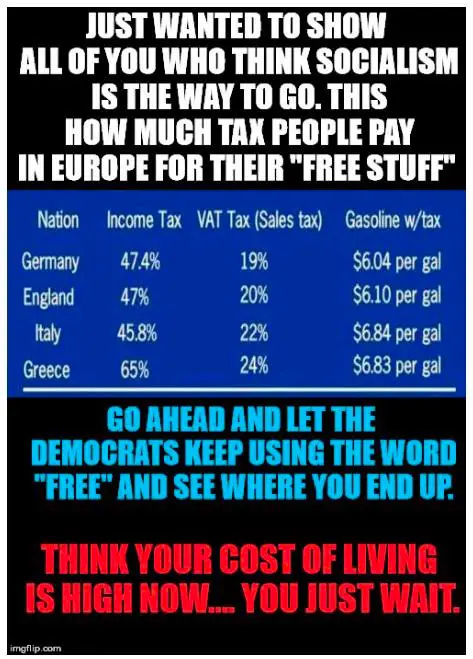On December 18, 2018, a Facebook user shared this meme about tax and purported socialism in several European countries:

In addition to a chart listing purported figures for Germany, England, Italy, and Greece, its text read:
JUST WANTED TO SHOW ALL OF YOU WHO THINK SOCIALISM IS THE WAY TO GO. THIS IS HOW MUCH PEOPLE TAX PEOPLE PAY IN EUROPE FOR THEIR “FREE STUFF”
GO AHEAD AND LET THE DEMOCRATS KEEP USING THE WORD “FREE” AND SEE WHERE YOU END UP.
THINK YOUR COST OF LIVING IS HIGH NOW…. YOU JUST WAIT.
As is very often the case, the meme did not come with any sources, citations, links, or other information supporting the claims made on the graphic. It wasn’t immediately clear why Germany, England, Italy, and Greece were chosen, or whether the figures cited were then-current. A table listed country, the rate of income tax, value-added tax (sales tax, known as VAT), and the cost per gallon of gasoline including tax for each nation.
Provided figures for income tax were 47.4 percent (Germany), 47 percent (England), 45.8 percent (Italy), and 65 percent (Greece). VAT or sales tax rates were said to be 19 percent (Germany), 20 percent (England), 22 percent (Italy), and 24 percent (Greece). And the cost of gasoline per gallon was purportedly $6.04 (Germany), $6.10 (England), $6.84 (Italy), and $6.83 (Greece).
Starting with income tax, we checked the rates for each country. The meme said that income tax in Germany was a very specific 47.4 percent; according to figures for 2018 the income tax rate in Germany was mathematically (not ideologically) progressive, starting at 14 percent and topping out at 42 to 45 percent (the latter for “very high incomes”). As for England, tax rates ranged (archived) from 0 percent on incomes up to £11,850 (approximately USD$15,000 as of December 2018) versus the meme’s 47 percent claim. The rate went up to 20 percent on incomes of £11,851 to £46,350, 40 percent for £46,351 to £150,000, and 45 percent for those earning more than £150,000. The UK’s “tax bands” (brackets) also counted any earner’s first £11,500 as non-taxable, meaning that taxpayers were taxed on their earnings minus that amount.
As for Italy, rates of taxation on income were progressive and ranged from 23 percent on the lowest earners, to 43 percent on those earning more than €75,000. No bracket was taxed at the meme’s 45.8 percent. Finally, Greek taxpayers were subject to a rate of 22 percent under €20,000, 29 percent under €30,000, 37 percent under €40,000, and 45 percent for those earning over €40,001. We were unable to substantiate any income tax rate in Greece of 65 percent, the figure the meme put forth.
By contrast, the United States’s number of tax brackets and attendant percentage rates featured a wider range (seven). The tax rate for its lowest earning bracket ($0 to $9,525/$13,600/$19,050) was ten percent, followed by 12 percent, 22 percent, 24 percent, 32 percent, 35 percent, and 37 percent for the highest earners. The meme seemingly used the highest tax rate for earners in the countries listed, and it would follow that the given relative tax rate for Americans would be the highest bracket as well — 37 percent.
However, all countries listed (and the United States) taxed earnings progressively, and all four plus the United States imposed far lower taxes on its lowest earning citizens. With the United States absent from the comparison, readers were much more likely to infer that the provided statistics were further out of line with American tax rates than they actually are.
Then the meme moved on to sales tax or VAT, taxes not necessarily directly comparable to one another. It claimed that consumers in Germany paid 19 percent VAT on their purchases, Brits paid 20 percent VAT, Italian shoppers 22 percent, and Greek buyers 24 percent. As with income tax rates, the meme only listed the highest VAT rates. In Germany, VAT ranged: zero percent on transport, seven percent on certain necessities (food and medical items among them), and 19 percent on the balance of taxable purchases. The same held for England, where VAT was zero percent on items like food and children’s clothing, five percent on “reduced” items like car seats, and 20 percent on other purchases.
In Italy there were five separate VAT rates: zero percent, four percent, five percent, ten percent, and 22 percent. Items not taxed or subject to lower tax rates included food, dining, and alcohol. Greece’s four VAT percentages were zero, six, 13, and 24 respectively, and food, beverages, and hotel stays were among things taxed at reduced rates. In all four countries listed on the meme, figures were once again cherry picked to produce or highlight the highest VAT rates without mention of a massive range of untaxed or reduced-tax items.
The United States proved a difficult country to measure in terms of sales tax rates, due to the range of difference between different states. However, in 2018 those numbers ranged from zero percent in some circumstances to roughly ten percent in the states with the highest combined sales taxes. By contrast, VAT is described as a more spread out form of consumption tax. Nevertheless, the meme lacked a benchmark against which American consumers could measure their own retail tax against European fiscal policy.
Finally, the meme referenced gas prices ranging from $6.04 per gallon (Germany) to $6.80 per gallon (Greece). Bloomberg.com published an interactive worldwide gas prices map in October 2018 that provided fairly recent averages for comparison to the meme. Worldwide, the United States ranks number 12 for lowest gas prices, behind Russia, Pakistan, Iran, and Venezuela. Bloomberg’s analysis supplied figures of $6.69 for Germany (vs. $6.04), $6.41 for England (vs. $6.10), $7.31 for Italy (vs. $6.84), and $7.36 for Greece (vs. $6.80). In the same ranking, per-gallon gas costs in the US were averaged at $3.15.
It should be noted that the overarching point of the meme was critique of the impact of socialism on income tax, sales tax, and fuel prices — but the country which ranked first for cheapest gas is Venezuela, frequently derided as having catastrophic socialist policies in American political discourse.
On the same day this version of the meme appeared, Reason.com published an editorial about socialist policy and its effect on residents of Venezuela. The cost of fuel can be taxes as consumption (with Scandinavian countries often referenced in op-eds), but an October 2018 editorial opposing those countries’ trade-offs focused more on income tax:
Sweden, Denmark, Norway, and other northern European nations do provide more social and economic benefits to their citizens than the U.S. Free childcare. Paid parental leave for mothers and fathers. Extended sick leave. Generous unemployment benefits. Shorter work hours and longer vacations. Universal healthcare. Free college tuition. Much higher retirement benefits than in the U.S.
How do those countries pay for all those benefits?
Start with consumption taxes. Most European countries don’t levy sales taxes. But they do have national value added taxes, which are similar to sales taxes but are less transparent. In the Nordic countries they average a little over 20 percent, three times Vermont’s sales tax.
Denmark has a 100 percent tax on cars, which means a $30,000 Toyota Camry costs $60,000. Filling up the car is expensive, with Nordic gasoline taxes over $3.00 per gallon, putting gas prices at about $7.00 per gallon.
This meme presented both an opinion about “socialism” or “free stuff” in Europe alongside purported factual information about how the unspecified “stuff” was funded. It inaccurately provided only the top income tax rates for its four countries (Germany, England, Italy, and Greece), without information about American tax rates for comparison. It utilized the same cherry picking style with respect to VAT rates in those countries, selecting only the highest levels — often inaccurately. Finally, it presented what appeared to be out-of-date gas price statistics for the four countries. Although some of its claims were not entirely off the mark, the meme creatively arranged partial truths, fiction, and inaccuracies to argue its point.
- Income tax in Germany for employees
- Income Tax rates and Personal Allowances
- Income Tax rates and Personal Allowances
- Italy- Income Tax
- Taxation in Italy
- Italy Individual - Taxes on personal income
- Taxation in Greece
- 2018-2019 tax brackets
- Value-Added Tax - VAT
- VAT rates
- International VAT and GST rates for 2018
- States with the highest and lowest sales taxes
- A national sales tax is coming
- Gasoline Prices Around the World: The Real Cost of Filling Up
- Here's How Much Americans Pay For Gas Compared To 60 Other Countries
- No, Venezuela doesn’t prove anything about socialism

